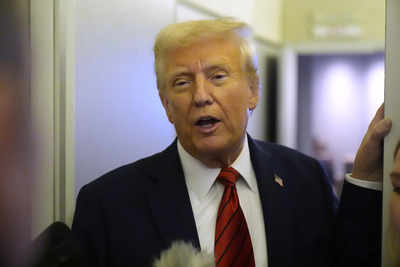Trump’s federal funding freeze puts US universities on the brink, but silence reigns – The Times of India

As President Trump’s second term unfolds, the nation’s universities are grappling with an unprecedented challenge that threatens to reshape the financial landscape of American higher education. With cuts to foreign aid and diversity programs looming, university leaders are fearing the loss of billions in federal funding but are largely hesitant to speak out. The fear of retribution from a president who has publicly glorified political consequences for opponents has left many administrators and professors quietly navigating uncertain terrain.
The Trump administration has ordered a freeze on billions in federal grants, including cuts to essential programs such as diversity, equity, and inclusion (DEI) initiatives and foreign aid. As a result, universities are now facing a situation where their research projects, particularly those funded by agencies like the US Agency for International Development (USAID), are at risk. These changes, according to The New York Times, have caused widespread uncertainty, yet the reaction from campus leadership has been strikingly muted.
Silent opposition: Fear of retribution and financial loss
Since the beginning of January, universities have found themselves on edge as Trump’s administration takes steps to freeze federal funding that many rely on for critical research and international projects. Programs such as USAID’s Feed the Future initiative, which has supported food security research across the globe, have been put on pause, affecting institutions like the University of Georgia and Mississippi State University. As reported by The New York Times, these universities are now scrambling to determine whether they can continue operations without the federal backing that has funded their projects for years.
Despite the financial uncertainty, university leaders have been reluctant to openly protest or challenge the administration. Many are wary of drawing attention to themselves for fear of reprisal. As quoted by The New York Times, Ted Mitchell, the president of the American Council on Education, explained that “the combination of uncertainty and fear of repercussions is nearly paralyzing.” The consequences of speaking out could be dire, with the possibility of further funding cuts or political consequences.
Millions in research funding at stake
In fiscal year 2023, the federal government allocated nearly $60 billion in research funding to universities, a critical lifeline for many academic institutions. However, the recent freeze on grants and funding cuts could put a significant portion of this money at risk. As reported by The New York Times, programs such as the Soybean Innovation Lab at the University of Illinois Urbana-Champaign, which has received over $50 million since 2013, now face uncertain futures.
Several universities, like the University of Wisconsin-Madison, have taken a cautious approach, advising faculty members to delay non-essential spending as they await further clarification. Jennifer L. Mnookin, chancellor of the University of Wisconsin-Madison, urged faculty to “hold off” on optional expenses, recognizing that the ongoing transition has created “an enormous amount of uncertainty.”
A growing concern for US leadership
University leaders are also concerned about the long-term effects of these cuts on America’s global competitiveness. The New York Times highlighted that programs supported by USAID not only help improve lives abroad but also ensure the US maintains its leadership in global research and innovation. As former Senator Mark Becker, president of the Association of Public and Land-grant Universities, put it, “We urge the administration to resume the critical work of USAID to assure American prosperity and security.”
Despite the uncertainty, many universities are focusing on working behind the scenes, lobbying their congressional delegations for intervention, hoping to minimize the damage caused by these funding cuts. However, until a resolution is reached, the silence on campus is deafening, with the looming threat of retribution making it increasingly difficult for university leaders to challenge the status quo.
















